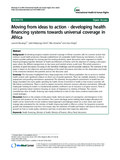| dc.contributor.author | Musango, Laurent | |
| dc.contributor.author | Orem, Juliet Nabyonga | |
| dc.contributor.author | Elovainio, Riku | |
| dc.contributor.author | Kirigia, Joses | |
| dc.date.accessioned | 2018-09-12T09:55:49Z | |
| dc.date.accessioned | 2020-02-07T10:46:09Z | |
| dc.date.available | 2018-09-12T09:55:49Z | |
| dc.date.available | 2020-02-07T10:46:09Z | |
| dc.date.issued | 2012 | |
| dc.identifier.uri | http://repository.must.ac.ke/handle/123456789/1430 | |
| dc.description.abstract | Accelerating progress towards universal coverage in African countries calls for concrete actions that reinforce social health protection through establishment of sustainable health financing mechanisms. In order to explore possible pathways for moving past the existing obstacles, panel discussions were organized on health financing bringing together Ministers of health and Ministers of finance with the objective of creating a discussion space where the different perspectives on key issues and needed actions could meet. This article presents a synthesis of panel discussions focusing on the identified challenges and the possible solutions. The overview of this paper is based on the objectives and proceedings of the panel discussions and relies on the observation and study of the interaction between the panelists and on the discourse used.The discussion highlighted that a large proportion of the African population has no access to needed health services with significant reliance on direct out of pocket payments. There are multiple obstacles in making prepayment and pooling mechanisms operational. The relatively strong political commitment to health has not always translated into more public spending for health. Donor investment in health in low income countries still falls below commitments. There is need to explore innovative domestic revenue collection mechanisms. Although inadequate funding for health is a fundamental problem, inefficient use of resources is of great concern. There is need to generate robust evidence focusing on issues of importance to ministry of finance. The current unsatisfactory state of health financing was mainly attributed to lack of clear vision; evidence based plans and costed strategies.Based on the analysis of discussion made, there are points of convergence and divergence in the discourse and positions of the two ministries. The current blockage points holding back budget allocations for health can be solved with a more evidence based approach and dialogue based on a clear vision and costed strategic plan articulated by the ministry of health. Improving health in Africa is a driver for long-term economic
growth and development and this is the reason why the ministries of health and finance will need to find common
ground on how to create policy coherence and how to articulate their respective objectives. | en_US |
| dc.language.iso | en | en_US |
| dc.publisher | BioMed Central | en_US |
| dc.subject | Health financing, Ministry of health, Ministry of finance, Africa, Panel discussion | en_US |
| dc.title | Moving from ideas to action-developing health financing systems towards universal coverage in Africa | en_US |
| dc.type | Article | en_US |

